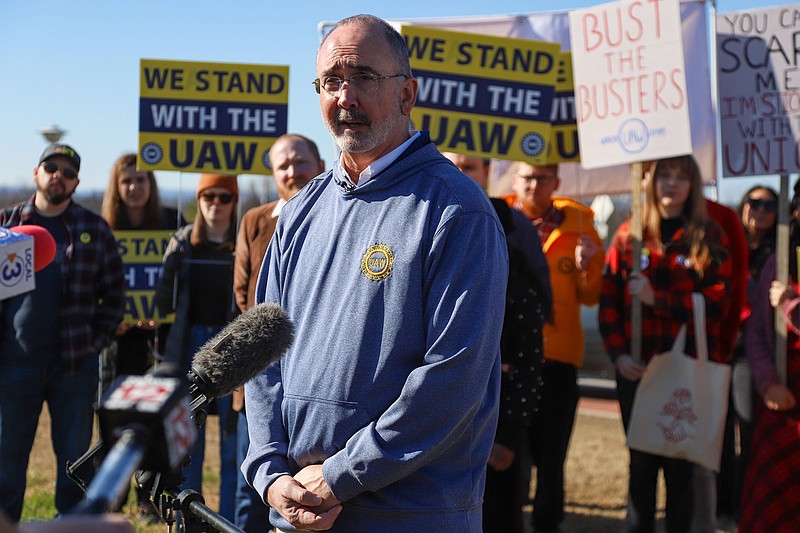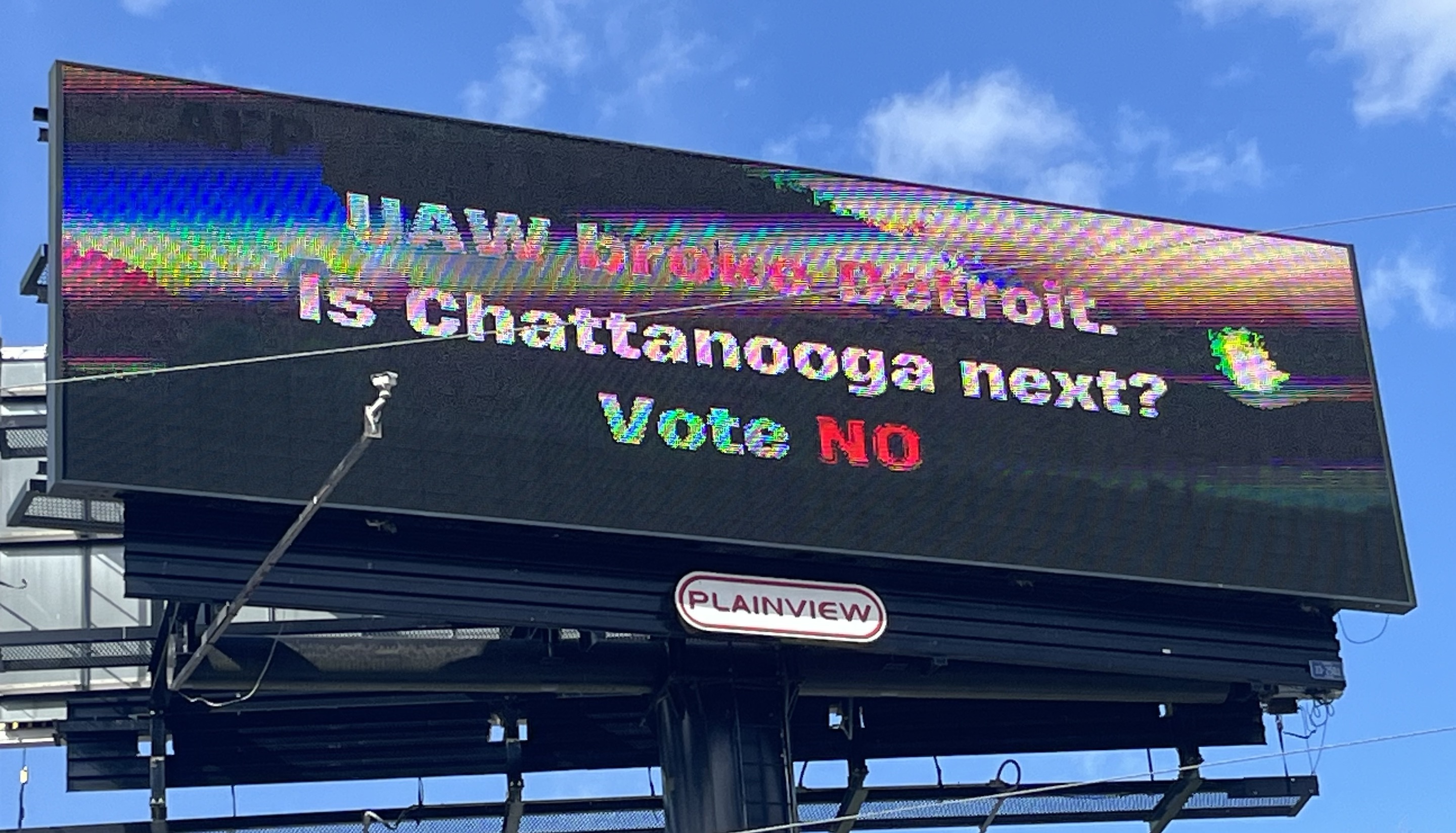As Volkswagen workers prepare to vote on whether to unionize VW's assembly plant in Chattanooga, a new statewide survey shows more than twice as many Tennesseans have a favorable view of the United Auto Workers compared to those with an unfavorable perception.
A poll conducted for the conservative Beacon Center, which recently surveyed 1,197 Tennessee voters in an online poll, found 44% of the respondents had either a very or somewhat favorable view of the UAW, compared with 20% of Tennesseans who said they had either a very or somewhat unfavorable view. The other 37% of those surveyed were either neutral about the Detroit-based autoworkers union or said they were not sure.
Mark Cunningham, vice president of strategy and communications at the Beacon Center, said the UAW enjoys a healthy amount of support even though Tennesseans voted overwhelmingly last year to put in the state constitution right-to-work protections against workers being required to join a union even when a majority of their fellow workers at a worksite vote to unionize.
"It is interesting that the UAW's unionization efforts at the VW plant in Chattanooga and future Ford plant are fairly popular, specifically when compared to the over 70% of Tennessean voters who voted to put right to work in the Tennessee Constitution," Cunningham said in an email. "It shows that while Tennesseans are strongly against forced unionization, they don't have a negative view of unions themselves, specifically the UAW."
Tennessee views about UAW
The Beacon Center survey of Tennesseans asked, "How do you view the UAW's unionization efforts?"
-- Very favorable: 22%.
-- Somewhat favorable: 21%.
-- Neutral: 21%.
-- Somewhat unfavorable: 11%.
-- Very unfavorable: 9%.
-- Not sure: 16%.
Source: The Beacon poll was conducted by Targoz Marketing and is based upon online responses from 1,197 responses across Tennessee.
Ford in 2021 announced it will build a truck plant and battery factory in West Tennessee, according to The Associated Press. That project is now under construction in Haywood County, northeast of Memphis.
Billy Dycus, president of the AFL-CIO in Tennessee, said worker support for labor unions is growing in Tennessee, especially after the pandemic.
"COVID was like a reawakening for a lot of people, especially here in the South," Dycus said in a telephone interview. "A lot more people are deciding that maybe being a part of a labor union that gives you a stronger voice in the workplace is not a bad thing."
From the pandemic lows reached in 2020, Tennessee has emerged as the state with the fastest rate of growth in union representation since 2020, according to the U.S. Bureau of Labor Statistics. In the past three years, union membership in Tennessee has grown by more than 57.5% from 113,000 in 2020 to 178,000 last year.
The share of workers represented by unions in Tennessee -- 6.9% last year -- was still 31% below the national average and ranked in the bottom fourth of all states in the share of workers belonging to a labor union. But as the Volunteer State has recruited Nissan, General Motors, Volkswagen and Ford Motor Co. to each build multibillion dollar assembly plants across Tennessee over the past three decades, the UAW has gained a foothold in the state and is working to represent thousands of more autoworkers.
VW workers vote again on UAW
Starting Wednesday, nearly 4,300 hourly workers at the Volkswagen plant in Chattanooga will begin a three-day union certification election conducted by the National Labor Relations Board to determine if the blue-collar VW workers want to be represented by the United Auto Workers. VW workers in Chattanooga previously rejected representation by the UAW in 2014 by a margin of 712-626 and again in 2019 by an even narrower margin of 833-779.
The UAW has yet to organize any of the foreign carmakers that have built assembly plants across the South in Tennessee, Georgia, Alabama, Kentucky, Mississippi and the Carolinas. Historically, workers in Southern states with right-to-work laws and less of a union tradition have been more wary about organized labor and the value of union representation.
(READ MORE: UAW files petitions for union vote again st VW)
UAW faces criticism
Tennessee Gov. Bill Lee and Hamilton County Republicans have urged Volkswagen workers to vote against UAW representation, which they claim is contrary to "Tennessee values" and could hurt the success of Volkswagen operations in Chattanooga by imposing restrictive work rules and raising production costs. Hamilton County Mayor Weston Wamp called the UAW "a sinking ship" that is moving south to gain members after losing membership and support following a corruption probe that sent two former UAW presidents to jail.
Hamilton County Commissioner Lee Helton, R-East Brainerd, called Detroit "the city (the UAW) helped destroy over decades."
"Is that what you really want us to become?" he asked VW workers during a recent news conference outside of the VW assembly plant.
Opponents of the unionization effort have also bought billboards in Chattanooga, claiming "UAW=Layoffs" and "UAW broke Detroit. Is Chattanooga next? Vote no."
(READ MORE: Gov. Lee says "don't risk future" with UAW)
Pay and job impacts
The unemployment rate in metro Detroit, where the UAW is headquartered, was 4.8% in February, nearly double the 2.7% jobless rate in the same month in Chattanooga, according to the latest figure from the U.S. Department of Labor. But the median pay for workers in Detroit -- $30.94 an hour -- was also 18.1% higher than the median pay of $26.19 an hour among all workers in Chattanooga last year, according to the U.S. Bureau of Labor Statistics.
UAW's current president, Shawn Fain, has vowed to change the way UAW operates, and last year he helped negotiate wage increases in contracts with General Motors, Ford and Stellantis along with what he said was more job security for workers. But the Center for Union Facts, a nonprofit group that bills itself as a labor watchdog, said hundreds of temporary, part-time autoworkers have been laid off since Jan. 1 by the Detroit Three.
After General Motors, Ford and Stellantis agreed to wage increases with the UAW, Volkswagen announced in November that it would be providing an 11% wage increase for production workers in Chattanooga -- one of the biggest wage increases since VW began production at its Chattanooga plant in 2011. Even with those wage increases, the UAW said VW's average hourly wage in Chattanooga of $23.40 is 6.8% below the comparable average hourly wage of $25.12 at Ford and that gap is projected to increase over time.
In last year's contract negotiations, Fain said if Detroit's three automakers raised CEO pay by 40% over the past four years, workers should get bigger raises than the 6% wage gains they had received in the previous four years.
Dycus said union support is growing as more workers see the growing gap between what CEOs and workers are paid by companies.
Nationwide, Gallup surveys show labor unions are enjoying more support in the U.S., with 67% of Americans last year approving of labor unions.
Last year's Work and Education poll by Gallup showed union support was down slightly from the 71% high reached in 2022, but with 2 of every 3 Americans saying they support unions, support for organized labor was up by more than a third from the all-time low of 48% reached in 2009 following the Great Recession.
Partisan divide
Union support is higher among Democrats than Republicans, and the partisan divide is particularly sharp for the UAW after the union endorsed President Joe Biden, who claims to be the most pro-union president ever and last year became the first sitting U.S. president to walk in support of striking UAW workers.
Wamp, the GOP mayor of Republican-leaning Hamilton County, denounced the UAW as "hyper partisan" in support of Democrats.
In the Beacon poll of Tennesseans, 55% of Democratic voters said they had a favorable view of the UAW, compared with 13% of Democrats who said they had an unfavorable view of the UAW.
But even among GOP voters in Tennessee, fewer than 1 in 4 said they had unfavorable views about the UAW. Among Republican respondents to the Beacon poll, 32% said they had a favorable view of the UAW and 24% had an unfavorable view.
Nearly 1 in 3 of all of the Tennessee respondents said they were either neutral or not sure about the UAW.
Contact Dave Flessner at dflessner@timesfreepress.com or 423-757-6340

